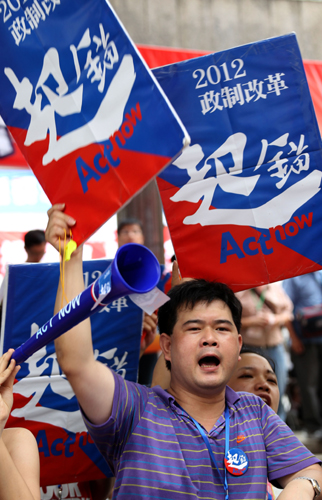Hong Kong elections hotly debated
The decision on how the Hong Kong chief executive will be elected in 2012 was held in suspense after a lengthy, contentious debate that lasted more than eight hours, marred by interruptions and drama in the Legislative Council (LegCo).
 |
|
Supporters of the Hong Kong government's political reform package wave banners outside the Chamber of the Legislative Council building in Hong Kong on Wednesday, as lawmakers debate the amended political reform package for 2012. |
The meeting adjourned at 10:10 pm on Wednesday night with a number of lawmakers still waiting to speak.
The debate resumes at 9 am on Thursday. After voting, the motion on the election method of the LegCo will follow. The entire debate on the two motions is expected to last for three days and run into Friday.
The LegCo began the debate on the 2012 electoral methods just two days after the SAR government accepted a revised proposal from the Democratic Party (DP). While the DP submitted a revised proposal, its member Andrew Cheung said "severe differences" exist between him and the party. He openly told the council meeting he would quit the party and vote against the reform package.
As proposed, the size of the Election Committee (EC) that chooses the chief executive will increase from 800 to 1,200 members. Each of the four sectors of the EC will also increase by 100 members.
Regarding the fourth, political sector, 75 of the 100 new seats will be awarded to elected District Council members, increasing the number of elected DC members to 117.
The tenure of an EC member is five years. The nomination threshold requires a candidate to have no less than 150 nominations and each EC member can only nominate one candidate.
The retention of the four sectors of the EC reflects a balanced representation of society, proponents said.
The EC will transform into the nomination committee when universal suffrage of the chief executive is implemented in 2017, said Secretary for Constitutional and Mainland Affairs Stephen Lam.
Chief Secretary for Administration Henry Tang described the debate as a historic moment for democratic development in Hong Kong. This proves that Hong Kong politics is becoming more mature, he said. Only by pursuing a mild, pragmatic and rational route can there be democratic advancement, he said.
In his submission, DP chairman Albert Ho said they had been working hard over recent months to address both confrontation and negotiation fronts.
The proposal of "one man, two votes", which enables about 3.2 million voters (excluding those with voting rights in the functional constituency) to choose the five new LegCo functional constituency seats, broadens the electoral base. The proposal has not only greater democratic elements but also resolves the political impasse, Ho said.
The party has not given up the quest for dual universal suffrage, as well as the abolition of the EC.
Albert Chan, of the League of Social Democrats (LSD), strongly criticized the DP for swaying their 2008 election pledge to strive for dual universal suffrage in 2012 and betraying the voters. In the party's view, the DP's "one man, two votes" proposal will all but make the functional constituency a permanent feature.
Other democratic lawmakers, including Lee Cheuk-yan and Ronny Tong, said that although they would cast negative votes, they were saddened by the verbal abuse from the LSD. They called on the pan-democratic camp to stay united and not to fling mud at one another.
 0
0 







Go to Forum >>0 Comments